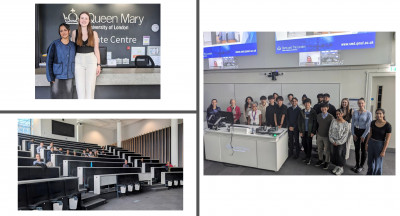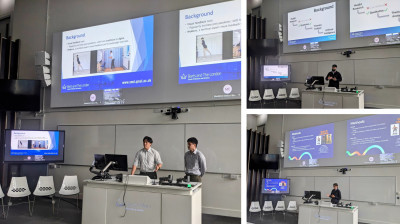News
Intercalated Symposium showcases future of healthcare innovation
3 June 2025


To raise awareness about the benefits of intercalation, Queen Mary University of London recently hosted its tenth annual Intercalated Symposium — a peer-reviewed scientific forum where medical students presented original research on a diverse range of health and disease topics.
The event featured 12 speakers showcasing key findings alongside scientists and clinicians from Barts Health NHS Trust and UCLH. Research themes ranged from robotics and pharmacology to women’s health and digital medicine.
Notable projects included:
- The role of NprC signalling in inflammation using mouse models of aortic aneurysm.
- A digital health tool called “We Move”, a webapp designed to track body movements during exercise.
- Research on how hormonal fluctuations across the menstrual cycle influence cognition and productivity.
- Development of phantom medical devices to monitor heart rate or detect colorectal cancer.
- Insights into patient-doctor communication and the behavioural effects of fatigue.
The symposium fostered cross-disciplinary discussion, with a networking event aimed at building collaborations between engineers, scientists and industry.
Intercalation, which allows students to take a year out of medical school to pursue a research led degree is seen as a valuable route to building professional skills in inter-disciplinary research, business and leadership. These competencies are increasingly essential for clinical academic careers, including sub-speciality training for applications to the Academic Foundation Programme.
Health Education England (HEE) is encouraging medics to embrace research and innovation by intercalating at MSc level as part of the education pathway, according to its latest mandate (sections 6.48–6.56). The move is part of a broader strategy to develop a future workforce equipped with the research skills and insights highlighted in the Keogh Mortality Review.
Queen Mary supports this initiative by offering intercalated BSc and MSc programmes. These degrees are eligible to be counted towards the qualifying year for NHS bursary funding, potentially easing financial pressures. With postgraduate qualifications becoming more important for subspecialty training, and offers an advantage in a competitive field.
Dr Tina Chowdhury who is the School's intercalated programme director said: "As postgraduate qualifications in interdisciplinary research become central to digital healthcare, events like the symposium underscore the critical role of intercalation in preparing doctors for the NHS."
| Contact: | Tina Chowdhury |
| Email: | t.t.chowdhury@qmul.ac.uk |
| Website: | |
| People: | Tina CHOWDHURY Zion TSE |
| Research Centre: | Bioengineering |




